Geist Q&A
We talk to key members of the Geist development team about the game's little-known multiplayer features, as well as their feelings now that the game is finished.
First announced at Nintendo's pre-E3 press conference back in 2003, Geist is a first-person adventure game that's scheduled to arrive on North American store shelves next week. So how does developer n-Space feel now that its game is finally finished? We spoke with Ted Newman, the game's producer; Erick Dyke, president of n-Space; and Dan O'Leary, Geist project manager, to find out just that.
GameSpot: First off, could one of you give us a brief overview of Geist in case some of our readers aren't very familiar with the game?
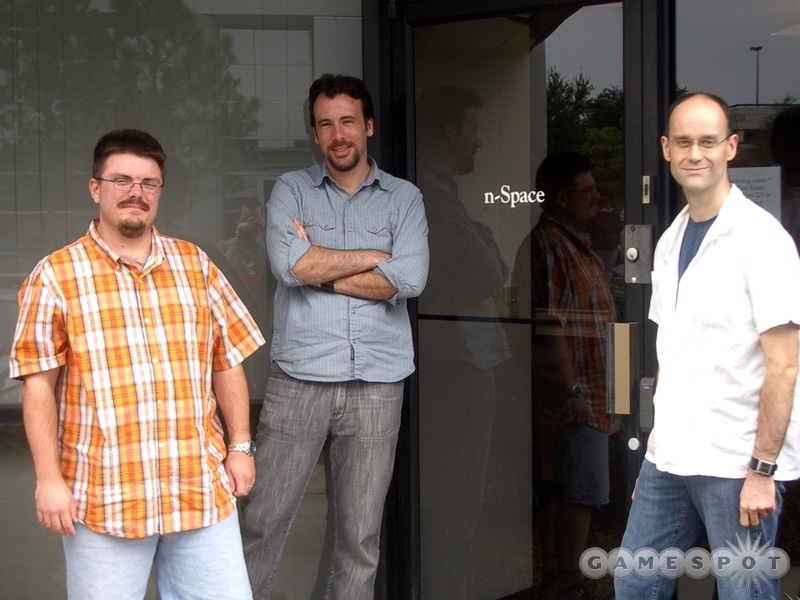
Ted Newman: Geist is basically a first-person adventure game where the player…early on in the game the player is essentially killed and their body is…their spirit is separated from their body and they play the rest of the game as a ghost, and they learn through the guidance of another ghost character named Gigi, who's a little girl who died in the same complex that the player is in. They learn that they can possess humans, animals, and objects, which they can use to traverse the Volks facility, which is where the player is killed at, and also very early on in the game you learn that your body is still alive, so that becomes a driving force to both find out what the Volks Corporation is up to and to recover your body if possible.
GS: Could you give us some specific examples of objects and creatures that players will be able to possess, and also what they'll be able to do while they're possessing those objects?
TN: Oh sure. For object possession, that was an idea game from Miyamoto-san, who had seen the game all throughout its development and he basically asked his team--he would bring it up several times in fact--I wonder what it would be like to possess a crate or to possess a plant, and for a while there his team didn't quite know what he meant or…
Erick Dyke: They thought he was joking.
TN: They actually…yeah, they thought he was joking, but then it became very clear that a big focus of the game was going to be on possession, and we decided to work on object possession. So some of the objects you possess are things like…some seem relatively safe like a pressure valve for some steam pipes, but in a case like that, if you rapidly press the A button you'll drive the steam pressure up and cause the pipes to burst, and if you time it right you'll scare a character in the area. Others are a little on the unusual side--the dog food is the one we hear about a lot, and some are more along the lines of something you'd find in an action game, like we have gun cameras throughout the levels where the player can possess the camera and then they use these twin Gatling guns to gun down enemies. 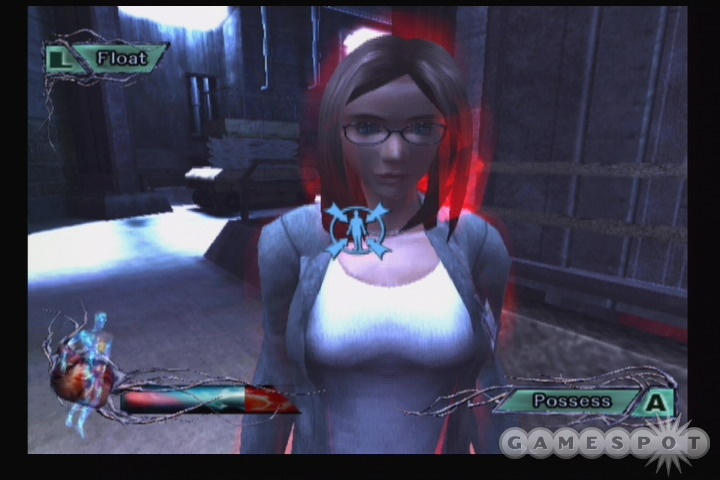
And as far as animals go, in the game you possess dogs, you possess rats, you possess rabbits, a bat, and with each of those we try to give them some unique navigation mechanics, like obviously the bat can fly, the rat is able to get into very small spaces that the dog can't get into, for example, and we also try to simulate their vision. So we did research on how a dog is actually supposed to see, like they're basically color blind but they can see certain colors, and they're nearsighted, so things in the distance are somewhat blurry. So we try to make each host, whether it was a human, an animal, or an object, feel unique.
GS: What kind of puzzles and stuff have you been able to create using all of those unusual mechanics? What's a typical puzzle in Geist?
TN: A typical puzzle would be either a scare, where you have a character in an area and a lot of times the character will be isolated, which makes them a better target to scare, and it's a matter of figuring out what objects in the room you can interact with and then how they might affect the character. So some of the puzzles are about herding the character into an area where it's easier to scare them. Other puzzles are either using hosts to gain access to areas that your average host wouldn't be able to get to, like either a locked door that requires a certain security clearance, or in the case of a dog, that can jump and climb over things, you know, like squeezing into an air vent that's located high up near some of these shelves or something. So that's a little bit of an idea of some of the puzzles in the game.
GS: So how are you making the puzzles become more and more difficult as the game progresses? Seems like most of the puzzles we've seen so far are pretty straightforward. 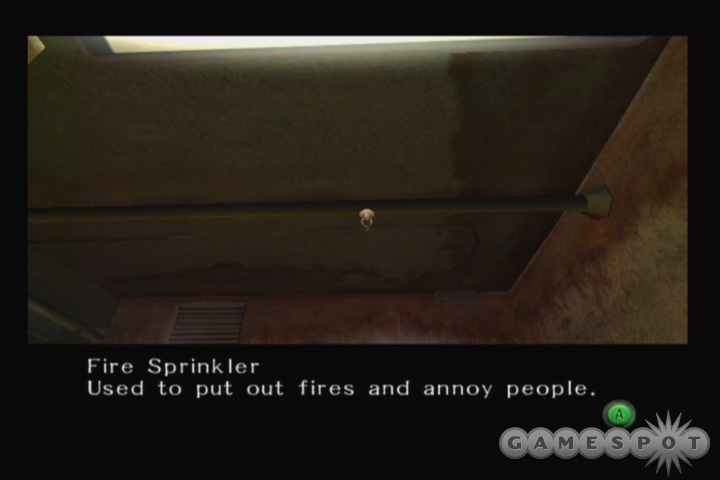
TN: There are some cases where the objects are harder to find, or trying to figure out how one object works in conjunction with something else, it becomes a little more difficult. But as the game progresses too, we start to work in a bit more action and some of the puzzles become more about how to take the host that you have and using them, plus objects in the area, to accomplish some goal, sometimes combat related. One of my favorite levels later in the game, for example, involves a weapons expert…a demolitions expert who has to blow up a number of missile towers, and you can try doing that with just his proximity mines, but you'll die pretty quickly because the whole place is guarded. But if you use…if you dispossess him and use things like explosive containers and gun cameras to help take out some of the opposition, it becomes more of a strategic level where basically you just…you just try to look for different ways to more efficiently take out the obstacle within a certain time.
GS: One of the things that we really don't know much about right now are actually the multiplayer options in Geist. So could you maybe tell us a bit about those? Do they incorporate all of the same gameplay mechanics?
Dan O'Leary: There are three modes of multiplayer in Geist, two of them draw a lot from what people would commonly see or commonly think about when looking at first-person multiplayer games. One of them is loosely based on a kind of a capture-the-flag mode, and one is based on a kind of deathmatch mode. But both of them fold in the possession mechanic, which really changes the whole feel and the whole…all the play mechanics and strategies that the players use, because you enter both of those games as a ghost and you have basically a selection of hosts that are ready for you to possess and each host has a different weapon. So it's a matter of finding the host with the weapon that you want--some of them are easy to get to, some of them aren't--and then possessing that character and then using him to combat the other players and bots and then scoring points by--depending on the mode--either by making the kills or by taking, in the case of the capture-the-host mode, actually taking the host that you've gotten and taking them to a base where you can deposit him to redeem the points that you've collected. So they're similar things. They're familiar elements of gameplay but basically very, very different experiences because of the possession modes or the mechanic.
The third mode is the most different of all and it's called hunt, and in that you have teams of players and bots playing as ghosts, and teams of players and bots playing as hosts, and the objective of the ghost is to possess hosts, and using a control fighting mechanic--which I'll describe in just a second--push them into hazards in the environment, whether it's spinning fans, electrical shocks, pit traps, and gas things, that sort of thing. And when you do that you score a point and you move on. The objective of the hosts in turn is to kill the ghosts and to stay alive. You use the control mechanic basically whenever you possess another player or bot. There's a…you…your controls and their controls fight one another and so as the ghost you're basically dragging the player toward these…towards these hazards, and as the host you are trying to use your weapons…your weapon and another method to get the ghost out of your body so that you can then shoot them. So it's entirely different. Difficult to explain, but folks get the hang of it pretty quickly and realize just how different and entertaining it is.
GS: So how many players and bots will the game support? 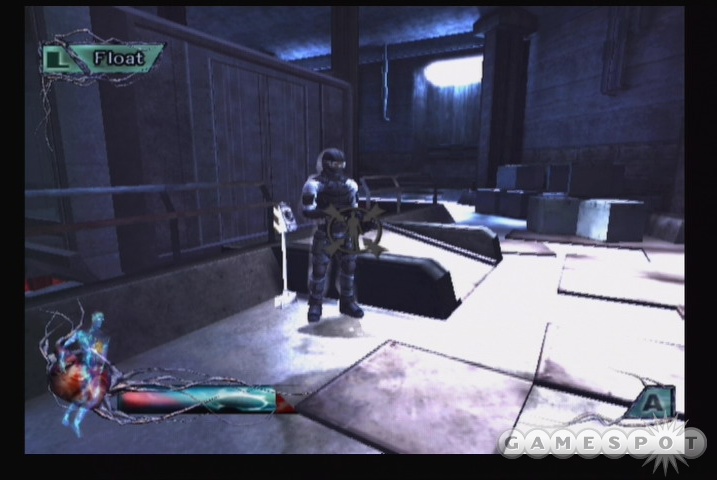
DO: Multiplayer supports a combination of eight players, and bots up to four players. But you can do one player and seven bots--any combination--you know, up to eight total entries, all four of which can be human players. Does that make sense?
GS: Yeah, and presumably the bots have kind of different difficulty settings and that kind of thing?
DO: Well we have difficulty settings and lots of options, advanced options, for setting…changing the way the point rules work and so on and so forth so--there's a lot of flexibility in setting up the multiplayer games or matches in a way that the players like to play.
GS: Geist has obviously been in development for quite a long time. What do you think are the advantages and disadvantages of having a game spend that long in development? 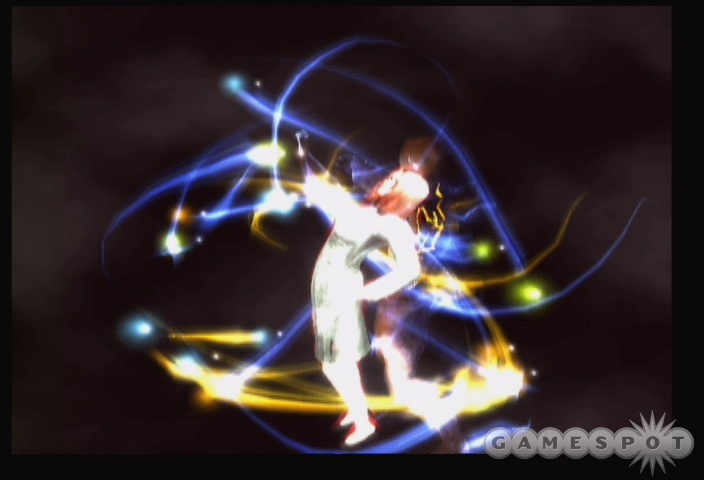
ED: Advantages and disadvantages of long development, that's really a good question. The advantages are we were working with such good partners as Nintendo and the people at NCL who…you know, their goal is always to make every game the best game ever, and in working with them they were constantly refining and changing the game and changing the concept and changing the idea to help us get to a game that they thought really maximized the unique thing that is Geist, which is the possession mechanic. So in the beginning the game was--as n-Space envisioned it--was a first-person shooter with possession. The game that Geist ended up being is a first-person adventure game, which largely relies on a possession mechanic, and so it's not so much a shooting game any more as an adventure game. And that journey for us was one that we took over all the time in development with Nintendo and, you know, as Ted mentioned, object possession wasn't an n-Space idea, object possession was something that came directly from Miyamoto-san, so when you're working with such caliber, legends, it can only be a wonderful thing.
The downside is that the team gets fatigued, and you get ready to ship a game and you want to ship a game, and you want to finish the game and it's just tiresome. I mean, you hear about long development cycles being great but, you know, there's only so much everyone wants to work on the same project day in and day out and that gets tiring. But, you know, the team really came together at the end, we had a very strong finish and we're very pleased with where we ended up.
GS: Actually our next question was going to be how does the finished game compare to the original vision for the game? You've already given a few examples of things that have changed; are there any others that you can mention? Like new features that were added or maybe things that were going to originally be in the game and then got dropped?
ED: I think originally we didn't imagine as many boss battles as what ended up in the final product, but we worked closely with Tanabe-san, who worked on Metroid Prime and Metroid Prime 2, and he saw some really good opportunities to take some existing boss battles we had and try to make them more unique, either by working in some possession mechanics or just more Nintendo-style patterns for the bosses. And then several new bosses got added as we went further in development and came up with just new ideas, and said, wow it would be cool to…if this thing came to life and you had to battle it, or something like that. So that's one example.
GS: What are you guys most proud of now that Geist is finished?
ED: Oh there's…that's a…there's so much.
DO: Why don't we each say one thing?
ED: OK.
DO: I would say as a partner here at n-Space and a project manager I think that the thing that I'm most happy about with Geist is that we went on kind of a bold adventure with Nintendo, and we tried something new and different, and I'm happy to say that Geist is a unique experience that people will enjoy and remember as something different and something unique that they were able to enjoy. So just the boldness of taking and…the market is difficult to introduce unique products in right now, and there's a lot of people wondering where the new games are, and I'm happy to say that we've done our best to create a really good new kind of game, new and different.
TN: I really enjoy some of the boss battles that came out of the game I think, and some of them are definitely a lot of fun and…you know even testing the game and playing it and tuning it as much as I did, there's still some battles, both boss battles and some of the…just in-game sort of puzzle battles that we have that I still enjoy going back and playing and just trying…trying to beat them in a different way.
ED: Even though you've played them about a hundred…two hundred million times.
TN: Yeah exactly, I hope that's a good sign.
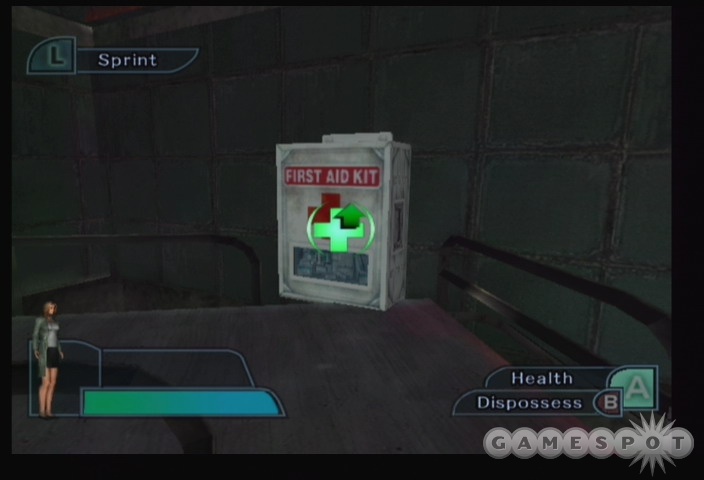
ED: I really think the multiplayer is a heck of a lot of fun and just came together really well. But, you know, overall I'd have to agree with Dan's answer, where for me so much entertainment and so many games are, you know, just more of the same, and working with Nintendo we were allowed to try something different. A game that takes a familiar setting, a first-person camera point, and we try to make a great possession game using it and, you know, to me the opportunity to…to make something that Nintendo signed off on at the end of the day and is happy with--and we're happy with--that is a possession game, was something I'm very proud of because it's an…like Dan said, there's very few opportunities in the market now to do new and creative product.
GS: So now that Geist is out of the way, what's next for n-Space? How excited are you about the next-gen consoles, for example?
ED: Oh we're very excited about the next-gen consoles. There's a lot of opportunity out there. It's a great time to be a developer in a lot of ways. As far as anything else up for n-Space, we're pretty much not allowed to talk about anything, but it's safe to say we're going to be around for a while.
GS: Thanks for your time.
Got a news tip or want to contact us directly? Email news@gamespot.com
Join the conversation